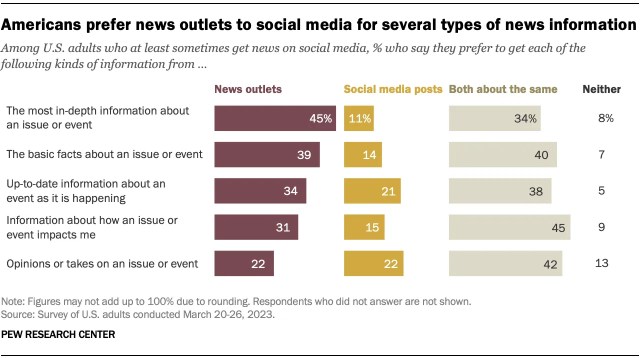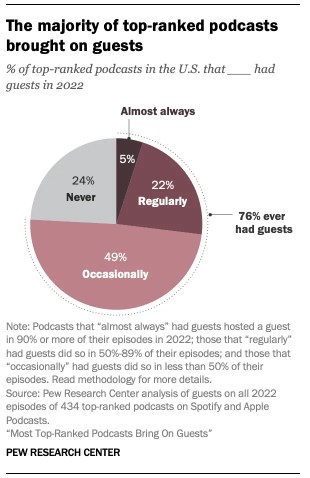☀️ Happy Thursday! The Briefing is your guide to the world of news and information. Sign up here!
In today’s email:
- Featured story: Facebook turns 20
- New from Pew Research Center: What Americans like and dislike about getting news on social media
- In other news: CNN staffers allege “journalistic malpractice” over outlet’s coverage of war in Gaza
- Looking ahead: Tucker Carlson interviews Vladimir Putin
- Chart of the week: Most top-ranked podcasts bring on guests
🔥 Featured story
It has been 20 years since Facebook first launched at Harvard. Over the last two decades, the site has transformed the way people connect online, and its reach has grown to 3 billion monthly users worldwide. In recent years, lawmakers and the public in the United States and abroad have grown more critical of Facebook and its parent company, Meta.
Three-in-ten Americans say they regularly get news from Facebook, according to a fall 2023 survey – higher than the shares who turn to other social media platforms for news. Still, among Facebook users, the share who say they regularly get news there has fallen from 54% in 2020 to 43% last year.
Our new analysis has five facts about how Americans use Facebook.
🚨 New from Pew Research Center
We recently asked Americans who get news on social media to describe – in their own words – the things they like and dislike most about getting news there. Here are key findings from our new analysis:
- People say convenience is the top reason they like to get news on social media. One-in-five social media news consumers say this.
- Inaccuracy is the top element that people dislike about getting news on social media; 40% cite reasons within this “inaccuracy” category, up from 31% in 2018.
The analysis also looks at whether people prefer getting different types of news from social media or directly from news outlets.

📌 In other news
- CNN staffers allege “journalistic malpractice” over the outlet’s coverage of the war in Israel and Gaza
- Meta urges tech industry to create standards for labeling AI-generated content
- Semafor plans to use AI to help curate news
- The Atlantic cuts ties with contributer Yascha Mounk after rape allegation
- Microblogging site Bluesky is now available to the public
- Dozens of journalists detained in Moscow during protests
- Websites posing as local news outlets push pro-Beijing content in 30 countries, study finds
📅 Looking ahead
Former Fox News host Tucker Carlson’s interview with Russian President Vladimir Putin – Putin’s first with an American media figure in more than two years – will air Thursday at 6 p.m. Eastern Standard Time on Carlson’s website.
A recent Pew Research Center survey found that about half of Republicans and independents who lean toward the Republican Party say the United States is providing too much assistance to Ukraine in its fight against Russia, compared with 16% of Democrats and Democratic leaners. Just 9% of Republicans held this view in March 2022, shortly after Russia’s invasion.
📊 Chart of the week
This week’s chart comes from our new analysis of podcast guests.
About three-quarters of top-ranked podcasts (76%) brought on at least one guest in 2022. This includes 22% that featured guests regularly and 5% that had guests in almost every episode.
Also explore our audio tour through America’s top-ranked podcasts.

👋 That’s all for this week.
The Briefing is compiled by Pew Research Center staff, including Naomi Forman-Katz, Jacob Liedke, Sarah Naseer, Christopher St. Aubin, Luxuan Wang and Emily Tomasik. It is edited by Katerina Eva Matsa, Michael Lipka and Mark Jurkowitz, and copy edited by Rebecca Leppert.
Do you like this newsletter? Email us at journalism@pewresearch.org or fill out this two-question survey to tell us what you think.